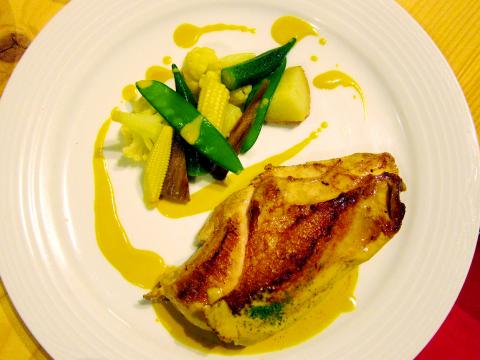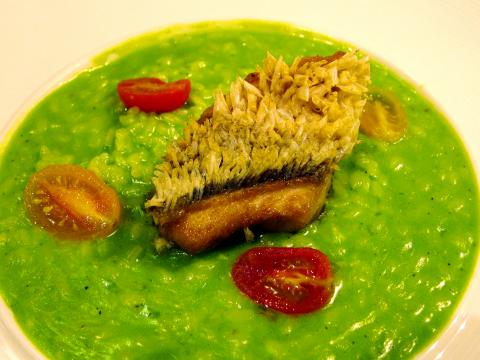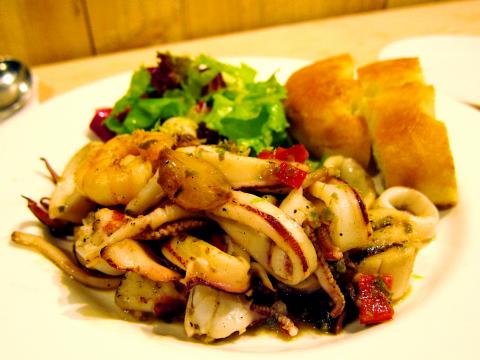Opened just last month on a quiet stretch of Jinan Road (濟南路), Ducky Restaurant already promises to become a favorite among Taipei’s foodies.
The restaurant’s goal is to use produce and meat grown or raised locally in dishes inspired by French cuisine, thereby creating new flavors and combinations. Ingredients include seafood and meat purchased daily from local markets. Ducky Restaurant’s menu is also reasonably priced. The most expensive entree is the steak-fries at NT$580, while most dishes cost between NT$300 to NT$450. A set meal is also available each night with a different main course.
As soon as you walk into Ducky Restaurant, you can sense its attention to detail. The dining room is filled with long blonde-wood tables designed for large groups and families. Large windows allow plenty of sunlight to pour in during the day and give diners a panoramic view of the tree-lined street and nearby Japanese-style houses.

Photo: Catherine Shu, Taipei Times
Dishes are also carefully designed. My dining companion and I ordered the grilled assorted seafood and tapenade with focaccia (NT$280) to split for our appetizer. Ducky’s menu of starters is very brief, and the only two other items are Caesar salad (NT$190) and potato fondant (NT$210), bamboo and grilled cabbage sprouts with truffle dressing, which our waitress suggested as a lighter alternative to the seafood.
We were very pleased with our choice, however — the dish featured a heap of juicy calamari and plump shrimp with cloves of grilled garlic, all tossed in the tapenade. It was simple, but delicious. The black olives in the tapenade provided a delicious contrast to the sweetness of the fresh calamari and shrimp.
My friend ordered the pan-fried chicken breast with Shaoxing cream sauce and seasonal vegetables (NT$380). The meat was very good — juicy and so tender that it could have been cut with a fork, but with a crispy, savory skin. The Shaoxing rice wine in the sauce, usually used in Chinese dishes like drunken chicken, added an unexpected flavor and depth to the dish.

Photo: Catherine Shu, Taipei Times
The pesto risotto with pan-roasted daily fish (NT$380) is one of the most visually striking dishes on Ducky Restaurant’s current roster. The fish is cooked until the skin is crisp and then laid on a bed of the green risotto, which is garnished with cherry tomatoes for some pops of contrasting color The risotto’s basil-based sauce was delicious and the plump, short-grain rice was suitably al dente, but I would have preferred if the dish was thicker and creamier. The fish, on the other hand, was fantastic.
Judging by the items being carried out of the kitchen to a full dining room, another one of Ducky Restaurant’s most popular items is the aforementioned steak-fries. The beef is prepared in a black pepper and red wine sauce.
For dessert we enjoyed one of Ducky Restaurant’s signature dishes, the apple creme brulee (NT$150). The indulgent treat is flavored with bits of stewed apple and a hint of cinnamon, making it much more interesting than the run-of-the-mill vanilla version.

Photo: Catherine Shu, Taipei Times
Despite being a newcomer, Ducky Restaurant is already enjoying brisk business, and reservations are highly recommended on weekends. The establishment’s menu is short, but it is clear that every dish has been created and prepared with care.

Photo: Catherine Shu, Taipei Times

President William Lai (賴清德) yesterday delivered an address marking the first anniversary of his presidency. In the speech, Lai affirmed Taiwan’s global role in technology, trade and security. He announced economic and national security initiatives, and emphasized democratic values and cross-party cooperation. The following is the full text of his speech: Yesterday, outside of Beida Elementary School in New Taipei City’s Sanxia District (三峽), there was a major traffic accident that, sadly, claimed several lives and resulted in multiple injuries. The Executive Yuan immediately formed a task force, and last night I personally visited the victims in hospital. Central government agencies and the

Australia’s ABC last week published a piece on the recall campaign. The article emphasized the divisions in Taiwanese society and blamed the recall for worsening them. It quotes a supporter of the Taiwan People’s Party (TPP) as saying “I’m 43 years old, born and raised here, and I’ve never seen the country this divided in my entire life.” Apparently, as an adult, she slept through the post-election violence in 2000 and 2004 by the Chinese Nationalist Party (KMT), the veiled coup threats by the military when Chen Shui-bian (陳水扁) became president, the 2006 Red Shirt protests against him ginned up by

As with most of northern Thailand’s Chinese Nationalist Party (KMT) settlements, the village of Arunothai was only given a Thai name once the Thai government began in the 1970s to assert control over the border region and initiate a decades-long process of political integration. The village’s original name, bestowed by its Yunnanese founders when they first settled the valley in the late 1960s, was a Chinese name, Dagudi (大谷地), which literally translates as “a place for threshing rice.” At that time, these village founders did not know how permanent their settlement would be. Most of Arunothai’s first generation were soldiers

Among Thailand’s Chinese Nationalist Party (KMT) villages, a certain rivalry exists between Arunothai, the largest of these villages, and Mae Salong, which is currently the most prosperous. Historically, the rivalry stems from a split in KMT military factions in the early 1960s, which divided command and opium territories after Chiang Kai-shek (蔣介石) cut off open support in 1961 due to international pressure (see part two, “The KMT opium lords of the Golden Triangle,” on May 20). But today this rivalry manifests as a different kind of split, with Arunothai leading a pro-China faction and Mae Salong staunchly aligned to Taiwan.